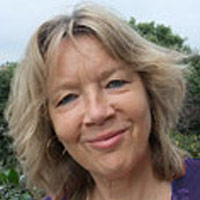Panel II
Please note that this Panel II will take place in Lecture Hall 2Gender-Bodies-Politics-Potentials
Moderation: Bettina Schroeter

Leading the panel: Bettina Schroeter, Dipl. Päd., HP, ECP, Trainer, Supervisor and therapist in BPT, Director of the Training Institute for Transformative Bodypsychotherapy, Berlin, member of the EABP since its foundation. Initiated and moderated panels about gender issues in recent DGK- and EABP congresses with a group of German colleagues. Coeditor with H. Krüger-Kirn of: “Verkörperungen von Weiblichkeit. Gendersensible Betrachtungen körperpsychotherapeutischer Prozesse” („Embodiment of Femininity. A gender sensitive perspective on BPT processes“) (2017)
Speakers
The Big Five of Mothers, or: The normal client is a mother
Anne Meinhold
Anne Meinhold

Anne Meinhold
Anne Meinhold; Berlin, mother of three children and a stepchild; dance and acrobat Artistschool; performer and dance acrobat ; Bodypsychotherapist and Supervisor, NLP- Master , Trauma therapist ,studies of adult education; body psychotherapist with single clients, couples, and people (women) traumatisated by war. Trainer for communication, teams and leadership.
Gender Stereotypes in Eastern and Western Culture
Edoardo Pera
Edoardo Pera

Edoardo Pera
Edoardo Pera, Psychotherapist with private practice in Rome: Analytical - Body Approach, Gestalt, EMDR, Family Constellations, Mindfulness. Trainer for SIAR (Società Italiana di Analisi Reichiana). International Consultant for projects in Jordan, Syria, Nepal, Tanzania, Irak–Kurdistan (concerning Psychotherapy, Trauma, Resilience, Psychological First Aid, Men Involvement, SGBV).
Non-binary Gender identities
Irena Markus
Gender identities that don't conform with the binary gender stereotypes, such as "Butch- Femme", transgender, gender- queer, are perceived as abnormal and as such, are not acknowledged as a valid experience.
BPT may support the embodiment process of other non-binary identities, by the embodiment of the marginalized non-binary gender, creating a new context, in which the gender identities were acknowledged as a new form of experience, with a new meaning and new genderial power relations.

Irena Markus
Irena Markus Body Psychotherapist, working in a private practice in Tel Aviv, Israel supervising in the public mental health system, group facilitation and teaching Process Work, Gender sensitive perspective on BPT and process work.
Pioneers of a New Manhood
Marc Rackelmann
Marc Rackelmann

Marc Rackelmann
Marc Rackelmann, born 1964, Dipl. Pol., HP Psychotherapy, ECP, is body-psychotherapist, couples-therapist and supervisor in private practice in Berlin. He is being educated for years in the Sexual Crucible approach by David Schnarch, in Sexocorporel sextherapy, as well as in pre- and perinatal work by Matthew Appleton. He used to work in education with young men on the subject of masculinity and sexuality. Member of the DGK, the EABP, peer reviewer of the IBPJ and has been on the board of the Wilhelm Reich Society for many years. He was part of the congress planning committee planning and organizing this congress. He is author of articles on couples-therapy, among other topics and of the 2017 book on male sexuality: Make Love – das Männerbuch (“Make Love - the men's book”).
